Welsh rugby icon singer Max Boyce turns 80
Despite having never played for Wales, Max Boyce is revered by many supporters as much as the country's most beloved rugby stars.
The entertainer turns 80 on Wednesday and is perhaps best summed up by an anecdote about watching an international in Murrayfield.
As adoring Welsh fans repeatedly approached him in the crowd for photographs, a bemused Scotland supporter asked "who did you play for?"
He smiled and said: "I never played."
The fans kept mobbing Boyce, leaving the Scotland supporter even more confused, wondering who he could be.
While he didn't step foot on the pitch during the 1970s, his songs defined this golden era as much as the exploits of Gareth Edwards or Phil Bennett.
"Little did I realise how much my life would change around this man," Sir Gareth said on BBC Radio Wales ahead of Boyce's birthday.
He described his rugby songs being sung around the world and those about coalmining communities leaving him in tears, adding: "I love his words and I love his humour."
On stage with a giant leek, rosette and shouting "oggy, oggy, oggy", Boyce was perhaps the team's biggest fan.
His songs immortalised the Pontypool front row and mythical outside half factory, where the mould that made Barry John was broken, while describing how pubs ran dry after Llanelli beat the All Blacks.
But there is one song which will forever link him to Welsh rugby - the first of our eight highlights to mark his 80 years.
Hymns and Arias, 1973
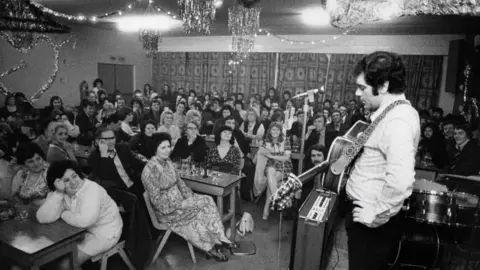 Getty Images
Getty Images"It's just tremendous. I never tire of hearing it. As a singer-songwriter with a love of rugby and Wales, to hear that being sung at the Millennium Stadium is something that you can't buy," he said.
Boyce described writing it at a "heady time" after Wales had beaten England at Twickenham, with the song describing a coach trip to the game.
He said never in his wildest dreams did he imagine it would be sung at rugby matches 50 years later, but admitted: "I wish I could change some of the lyrics now.
"It's not my greatest but it's just caught the public's imagination and they've sung it ever since."
Live at Treorchy, 1974
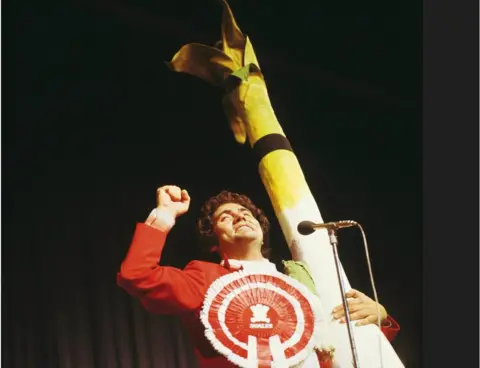 Getty Images
Getty ImagesBoyce's live show at Treorchy rugby club sold 500,000 copies after it was released as an album.
While a performer, he was also a social commentator on a south Wales that was changing.
Some of his bittersweet music focused on the effect of colliery closures on his home village of Glynneath, Neath Port Talbot, and others in the valleys.
Ahead of singing Duw It's Hard, he told the audience: "Having worked underground for nearly eight years, I feel like I'm qualified to sing this song.
"Lots of people were sad when colliery closures came to south Wales, but as one who had worked underground for a long time I wasn't particularly sad.
"And I wrote this song when they closed the colliery down in my little valley."
Tinged with sadness, Duw It's Hard describes the hardships of mining and how the old pithead baths is now a supermarket.
We All Had Doctors Papers, 1975
The follow-up, recorded at Pontarddulais RFC, became the only comedy album to top the UK album charts.
As well as his own works, Welsh-speaker Boyce performed two traditional songs - Sosban Fach and Ar Lan Y Mor, which he described as the "simplest and loveliest" Welsh folk songs, and his favourite.
Dallas Cowboys, the 1980s
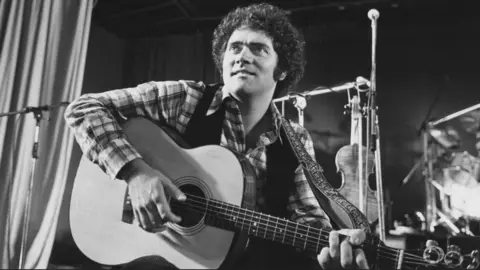 Getty Images
Getty ImagesPerhaps Boyce had little to sing about during the 1980s and '90s, as Welsh rugby descended into a seemingly never-ending period of decline.
Instead, he turned his attention to the silver screen and became a household name across the UK.
He starred in sketch show, This Is Max Boyce, trained with the Dallas Cowboys NFL side for one series and tried his hand at being a rodeo rider in Boyce Goes West.
In an unlikely combination, he also teamed up with former Beatle Ringo Starr and comedian Billy Connolly to take part in the world elephant polo championships in Kathmandu, Nepal.
World Cup, 1999
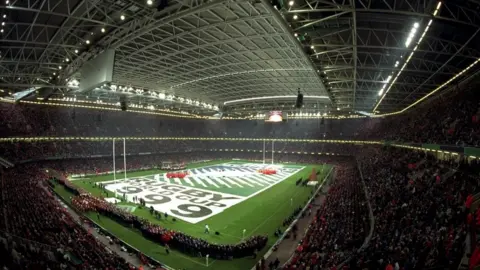 Getty Images
Getty Images"We're going to sing Hymns and Arias like it's never been sung before."
At the dawn of a new era for Welsh rugby, it was perhaps fitting Boyce was there to herald it.
Wales hosted the 1999 World Cup and he performed during the opening ceremony with a new version of his greatest song at the newly-finished Millennium Stadium.
As the roof opened ahead of the first game with Argentina and light shone through, he sung: "They say it's got a sliding roof that they can move away.
"They slide it back when Wales attack so God can watch us play."
Grand Slam, 2005
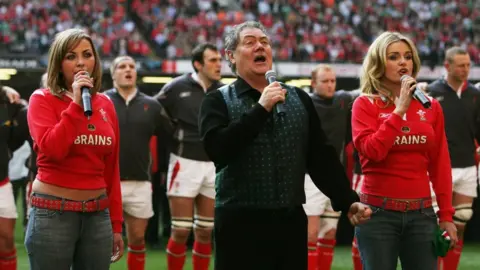 Getty Images
Getty Images"This day has been long coming and my nerves are in a state, because we haven't had a day like this since 1978."
With another version of Hymns and Arias, Boyce captured the mood of the nation as Wales went in search of a first Grand Slam in 27 years.
Part of the reason his original songs immortalised the 1970s was, because for a long time, it seemed the team would never scale the same heights again.
But on a glorious March day in 2005, the ghosts were finally put to rest and it was fitting he was there to see them home against Ireland.
When Just the Tide Went Out, 2020
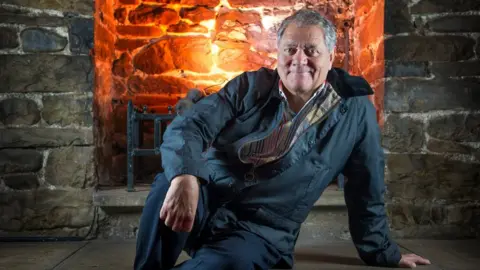 Getty Images
Getty Images"I wanted to write something that would be memorable and maybe look back one day and say 'well, I captured a moment of space and time'."
Boyce wasn't talking about a rugby match, but a poem he dedicated to the NHS during the Covid pandemic.
Glynneath RFC, 2023
Ahead of his birthday, he took part in a BBC Radio Wales celebration in his home village which he said was "steeped in rugby football, it's part of the fabric of this community".
Asked what rugby moment he would go back to from the past 50 years, he said the victory over England at Wembley in 1999.
As the Millennium Stadium was being built, Wales painted that corner of London red, and he said: "I've so many memories of that day, including singing the anthem with Tom Jones before the game."
Singer Bronwen Lewis, who he has toured with, performed Hymns and Arias, but with new lyrics about him.
As he turns 80, it would be fitting if he had cause to write a 2023 version of his greatest song - perhaps around 28 October, the date of the Rugby World Cup final.
